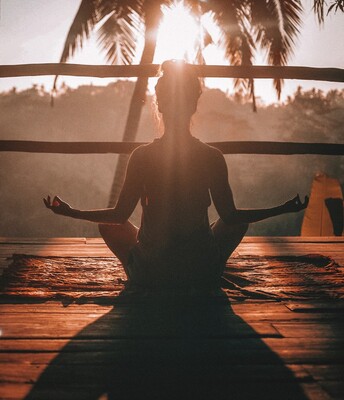
"I've never been afraid of big moments. I get butterflies. I get nervous and anxious, but I think those are all good signs that I'm ready for the moment." - Steph Curry
Almost if not every athlete experiences nervousness and/or anxiety about their performance from time to time. What separates the elite athletes from everyday players is the ability to control and even use this nervous energy for their benefit. This, however, is not an easy task to accomplish.
“CALM DOWN!” … We have all heard this from coaches, parents, and teammates before or during a performance where it is evident that anxiety has overtaken our control. But this is easier said than done. Anxiety has potentially detrimental physiological effects on the human body. These effects can easily inhibit athletes from achieving their full potential in competition.
When we experience nervousness or anxiety, the bodies autonomic nervous system kicks in. The system is divided into two parts: The sympathetic and parasympathetic system. The sympathetic side kicks in immediately when we experience a threat, physical or emotional, and begins to produce visible and non-visible physiological reactions. These reactions include increased heart rate, shaky hands, rapid breathing, sweating, loss of attention flexibility, loss of focus, and butterflies in the stomach. These reactions are both cognitive (mental) and somatic (physical) in nature and can easily disrupt and prevent high level performance. During this stage of reaction, the bodies adrenal gland produces hormones such as dopamine, epinephrine (adrenaline), and norepinephrine (stress hormone) collectively called catecholamine hormones. Scientifically speaking, anxiety literally causes physiological reactions that can and do prevent performance in athletes. So how do we combat these anxious side effects?
Well that is where our anxiety reduction techniques and the other half of the autonomic nervous system, the parasympathetic side, comes in. Our parasympathetic system is responsible for reducing the effects of the sympathetic nervous system. The parasympathetic system metabolizes those catecholamine hormones we discussed earlier in order to counteract the physiological effects. In order to help the parasympathetic system do this faster, we must reduce the amount of catecholamine hormones in our system. This is where our stress/anxiety reduction techniques come in to play. Taking deep breaths, tension/relaxation exercises, positive self-talk, visualization, and meditation all “calm the nerves” and reduce the amount of catecholamine hormones being delivered into the blood stream. The neurophysiology of arousal and anxiety help explain that 1) there is a reason nervousness leads to lower performance and 2) we can in fact hijack our own system to work back in our favor.
In this article, I will specifically talk about and look at deep breathing techniques. Deep-Breathing is an effective way to mitigate those negative hormones associated with anxiety/nervousness, so let's examine a few.
1) Box- Breathing: this technique involves breath holds, inhalation, and exhalation all following a count. The athlete will inhale for 4 seconds, hold it for 4 seconds, exhale for 4 seconds, and hold again for 4 seconds to assist them in slowing their breathing and heart rate and finding better control of their physiological state. I have included a great site that has a visual of box-breathing.
https://www.psychotherapistaustin.com/blog/box-breathing
2) Dragon Breath (my athletes have a good time with this one): This technique involves one deep-breath in, then one large exhalation/sigh like you were breathing out fire, hence the name. This technique produces an instant feel of tension relief in the head and neck and works well with a body scan. It may seem silly, but that's also part of the point. Finding some humor in the technique only assists in the alleviation of anxiety. I have attached a short video of this one. The user in the video does a somewhat over the top version (sticking out the tongue and flaring the hands) but it gets the point across.
https://www.youtube.com/watch?v=djJNgTTPQyc
3) Body Scan or Meditative Breathing: This technique is familiar if you have ever done meditation (because that is what it is). This involves finding a comfortable seated position or lying down if possible (maybe on the bus ride to a game) and taking 3-4 deep intentional breathes. After that, let your breathing go back to normal and then begin scanning your body for tension spots, letting go of the tension as you go. Once you have done your full body tension scan, focus back on your breath. Feel it enter and exit your nostrils. Feel your chest and stomach rise and fall. notice the temperature of the inhale and exhale. Do this for 5-15 minutes depending on the time allotted.
There are a ton of great apps with guided meditations that can help beginners. I use Soothing Pod.
4) Rapid Breathing: This technique is similar to hyperventilation, only it is intentional and results in better control of the breath. It involves taking quick breaths, inhaling and exhaling, gradually getting larger (more oxygen inhaled, CO2 exhaled) as you go until you feel in control of your breathing and your heart rate feels balanced. Each breath cycle for the first few should be around a 1 second inhale and a 1 second exhale. Gradually working closer to box-breath timing, 4 seconds in 4 seconds out. This technique is also associated with holotropic breathing if that is something you'd like to research and try as well.
There are several more breathing techniques in addition to the 4 above. If you try these techniques and they don't work for you, please research and try-out others until you find one that helps alleviate your symptoms of anxiety. The best strategy involves combining techniques like deep-breathing, self-talk, and visualization in order to manipulate your physiology to work for you. Whichever technique you use one thing is for sure, deep-breathing is a great way to play and win the Head Games.
1. Register your company
2. Create a searchable listing
3. Connect with more clients
